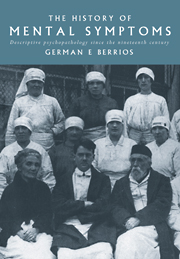Book contents
- Frontmatter
- Contents
- PREFACE
- ACKNOWLEDGEMENTS
- INTRODUCTION
- PART I The object of inquiry
- PART II Cognition and consciousness
- CHAPTER 3 Disorders of perception
- CHAPTER 4 Thought disorder
- CHAPTER 5 Delusions
- CHAPTER 6 Obsessions and compulsions
- CHAPTER 7 Mental Retardation
- CHAPTER 8 Cognitive impairment
- CHAPTER 9 Memory and its disorders
- CHAPTER 10 Consciousness and its disorders
- PART III Mood and emotions
- PART IV Volition and action
- PART V Miscellany
- REFERENCES
- NAME INDEX
- SUBJECT INDEX
CHAPTER 5 - Delusions
from PART II - Cognition and consciousness
Published online by Cambridge University Press: 08 January 2010
- Frontmatter
- Contents
- PREFACE
- ACKNOWLEDGEMENTS
- INTRODUCTION
- PART I The object of inquiry
- PART II Cognition and consciousness
- CHAPTER 3 Disorders of perception
- CHAPTER 4 Thought disorder
- CHAPTER 5 Delusions
- CHAPTER 6 Obsessions and compulsions
- CHAPTER 7 Mental Retardation
- CHAPTER 8 Cognitive impairment
- CHAPTER 9 Memory and its disorders
- CHAPTER 10 Consciousness and its disorders
- PART III Mood and emotions
- PART IV Volition and action
- PART V Miscellany
- REFERENCES
- NAME INDEX
- SUBJECT INDEX
Summary
Historically, the concept of ‘delusion’ is intertwined with that of ‘insanity’ and depends upon contemporary theories of thinking and belief. On the continent, and up to the 1850s, délire and Wahn referred to either madness or delusion (the French term also named ‘organic delirium’). Since the sixteenth century, the English word delusion has meant ‘fixed false opinion or belief with regard to objective things’ (OED, second edition). This intellectualist definition, albeit narrower, is easier to explore than its continental counterparts.
Delusions before the nineteenth century
Continental views
A good place to start is the French Encyclopédic where délire is defined as ‘an error of judgment by the spirit, during wakefulness, of things known to all.’ The author used the same word to refer to delusion and delirium and offered the same causal mechanism for both. Delusion and delirium were to be distinguished on the bases of aetiology, course, intensity, presence or absence of fever. All forms of délire were ‘organic’: ‘the soul is always in the same state and is not susceptible to change. So, the error of judgment that is délire cannot be attributed to the soul but to the disposition of the bodily organs.’ Tension and relaxation of nerves led to manic or melancholic délire, respectively; and according to the number of nervous fibres involved, délire was universal (organic delirium) or particular (delusion). Severity may range from mild to severe and was proportional to the ‘strength of internal sensations’. In délire internal sensations are stronger than external ones. In a first stage, internal sensations impinge upon consciousness but no judgment is made (i.e. the subject remains insightful); and in a third stage, emotions compound the picture.
- Type
- Chapter
- Information
- The History of Mental SymptomsDescriptive Psychopathology since the Nineteenth Century, pp. 85 - 139Publisher: Cambridge University PressPrint publication year: 1996
- 1
- Cited by



